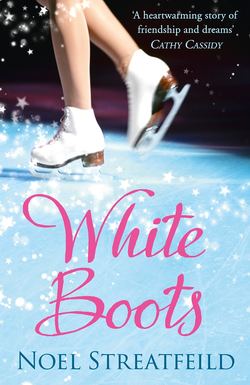Читать книгу White Boots - Noel Streatfeild - Страница 14
ОглавлениеChapter Five AUNT CLAUDIA
HARRIET’S FATHER HAD been at the same school as Uncle David. It did not take Lalla long to find this out, but it took what seemed to Lalla months and months, and was really only three weeks, before Uncle David had managed to see Harriet’s father. Although Lalla thought Uncle David was being terribly slow, he was really doing his best. First of all he went to Nana and asked what she thought of Harriet, and on learning that Nana had liked both her and Olivia, he made enquiries about the Johnsons and the shop. He tried to find some way in which he could meet George Johnson in the ordinary way, for he was certain that if he could produce Harriet’s father as an old school friend, and not as somebody who kept a peculiar sort of shop, it was much more likely that Aunt Claudia would think Harriet a good friend for Lalla. Meanwhile, whatever Aunt Claudia might think, Lalla and Harriet met every day at the rink, and every day they became greater friends.
Apart from meeting Lalla, Harriet was beginning to enjoy the rink. Every afternoon, just before the session started, she arrived, saw Sam, collected her skates and boots, put them on and was waiting, her eyes on the entrance, for Lalla and Nana several minutes before they could possibly arrive. If there had been no Lalla, Harriet would have taken twice as long learning to enjoy skating. Probably, if there had been no Lalla, she would still have been at the stage of creeping on to the rink, afraid to move far for fear of being knocked down. Because of Lalla’s lessons she had discovered quickly that moving about on ice was not really frightening, and that even cotton-woolish legs like her own could make skates move in the direction they wanted them to. Lalla was determined to make Harriet a skater. She could not spare much time from her own practice to give her a lesson, but she took her round with her to get her used to moving on skates, and she saw she only rested when there was dancing, and spent the afternoon moving round by herself.
“I know it’s dull just moving along like that, but you’ve got to do it, Harriet, or you’ll never get on to anything more interesting. Your legs look heaps better since you’ve come skating, honestly they do.”
Harriet knew that not only her legs, but all the rest of her looked better since she had come skating. Everybody at home remarked on it, and Dr Phillipson, when he came to see her, was so pleased that he said he should visit Mr Matthews an extra time as a thank offering. Harriet thought that was a very odd sort of thank offering, because she would not have wanted a visit from the doctor as a thank-you present herself; but she was glad Dr Phillipson was so pleased that he wanted to thank Mr Matthews, and if Mr Matthews liked a visit from the doctor she was glad he should have it. The person who was most proud of Harriet looking so much better was Alec. He felt as though it was he who was making her well, for after all it was his two shillings which paid for the skates, and so when it was wet and cold while he was on his paper round he did not mind as much as he might have done.
“It’d be much worse the weather being awful,” he told Toby, “If Harriet wasn’t getting any better, I should feel then it was all for nothing.”
Toby peered at Alec through his spectacles.
“Mathematically speaking, if Harriet was not getting well, that fact would be cancelled out by the two shillings weekly towards vegetables for the spring.”
Alec told Toby to shut up with his mathematical nonsense, but all the same he agreed with him about the two shillings a week. Two shillings a week adds up quickly when it is put in a money-box. Besides, to Alec it was more than two shillings a week, it was adventure, the capital that was to start him out on a magnificent career. On scraps of paper in his pockets, in his bedroom and in his desk at school were plans of how he intended his father’s shop to look. There were arrows pointing to piles of fruit and vegetables. Each plan covered a different season of the year, and each was so ambitious that had he been able to buy all the things for his plan his father’s shop would have looked like an exhibition of fruit and vegetables at a flower show. His vision of what he would buy in the spring was helped by Mr Pulton, who sometimes said to him when he paid him on Saturdays:
